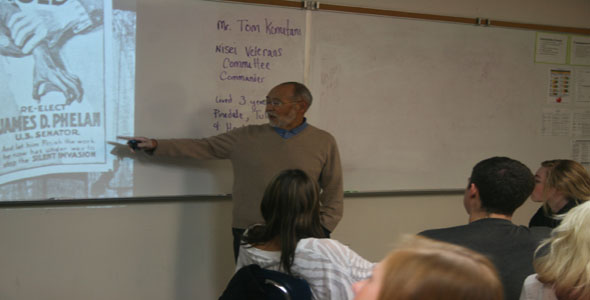Liberty had the rare opportunity to have Japanese internment camp survivor Tom Kometani appear as a guest speaker for European Studies classes on November 7 to talk about both the incarceration of Japanese Americans during World War II and his own personal experience in the camps.
“We need to hear from these people because unfortunately it happened a long time ago and they’re becoming very rare because they’re so old. So we better hear their story while they can still tell it,” European Studies teacher Peter Kurtz said.
Kometani delivered a lecture called “Lessons Learned from the Japanese-American Experience” to Kurtz’s third and fourth period European Studies classes. He was a very young child when he was incarcerated by the US government after Executive Order 9066 following the bombing of Pearl Harbor. His lecture detailed the fear, war hysteria, and racism that led to the forcible relocation of Japanese Americans living in America through multiple black and white photos in a power point presentation.
“I was shocked because I’d never heard of it and it happened in my backyard… right around where I basically have vacationed and lived my entire life,” sophomore Kellen Cooke said
His family had to suffer through cold winters as well as his dad’s separation from his family for work outside the camp. Despite the injustices committed against him and his people, Kometani feels no resentment towards the American government.
“I’m proud of my Japanese heritage, but I’m an American first,” Kometani said. The main message of Kometani’s lecture was to hold one’s government accountable for its actions. He tried to pass on the message to students that politicians’ duty is to defend the Constitution and people’s civil rights, and it is ours to make sure they do this. Kometani compared the persecution the Japanese Americans faced following Pearl Harbor to modern day persecution faced by Islamic Americans following 9/11 and the unequal rights for homosexuals.
“It’s about 70 years ago that [Japanese internment] happened, and yet it’s still relevant today,” Kometani said.
Students were shocked and very interested in the presentation. Of the class of about thirty, only five knew of the Japanese Americans’ incarceration during World War II. Most expressed serious surprise and disappointment at hearing of the blatant injustices their government had committed, some comparing it to the Holocaust. But most of all, students were very impressed by the perseverance and fairness of the Japanese, such as the Japanese Nisei soldiers, who fought for America and went on to become the most decorated military troop in history despite the injustices committed against them by the country they defended.
“I feel like America was being really hypocritical because we were trying to stop the Germans from doing the Holocaust, and yet we were doing the same thing to the Japanese. We were pretty much just locking them up, taking their freedom away which is against everything our founding fathers wrote with the Constitution,” junior Jarett Hopewell said.



